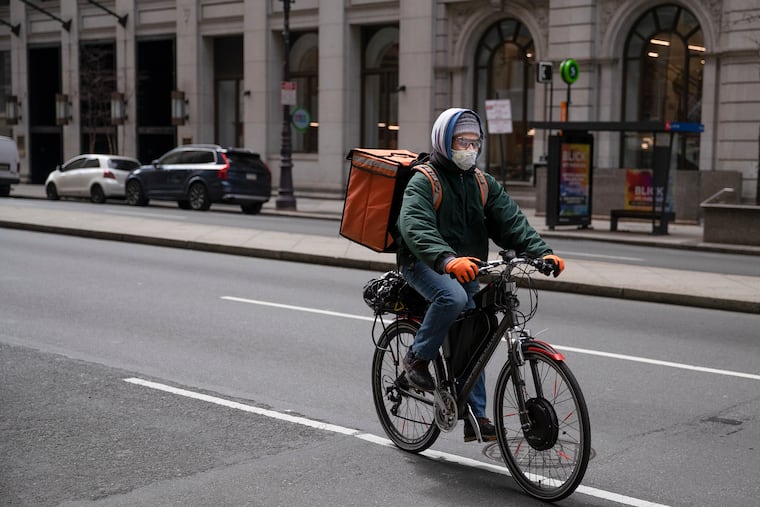Philly Council votes to restore paid COVID-19 sick leave mandate for low-wage workers
The bill allows workers to take paid leave to get vaccinated, quarantine due to COVID-19 exposure, care for a sick family member, or stay home with a child whose school closed due to the virus.

Philadelphia City Council Thursday voted unanimously to restore a policy of granting two weeks of immediately available coronavirus-related paid sick leave to thousands of essential workers in the city.
Philadelphia’s original pandemic paid sick leave mandate was passed in September and expired at the end of the year, leaving gig workers — like those working for GrubHub, Instacart, and Uber — without mandatory instant access to sick days rather than having to accrue them. App-based gig workers classified as independent contractors typically do not have access to the same protections to which employees are legally entitled.
The Council bill passed Thursday included newly expanded qualifications, which allow workers to take paid leave to get vaccinated, recover from vaccine side effects, quarantine due to COVID-19 exposure, care for a sick family member, or stay home with a child whose school or day-care facility closed due to the virus. The mandate applies to employers with more than 50 workers, covers anyone who physically reports to their job, and is in place until the coronavirus is no longer declared a public health emergency.
The bill is under legal review before going to Mayor Jim Kenney for a final signature, said city spokesperson Lauren Cox, adding that the administration supports the measure.
Employers who provide emergency paid sick leave to their workers are eligible for federal tax credit.
The reinstatement of Philadelphia’s paid sick leave protections became more urgent into 2021, unions said, as the city eases restrictions on restaurants, sports, and retail, putting more people back to work and with greater potential exposure to the virus. A study from University of Pennsylvania and Independence Blue Cross found that essential workers in Philadelphia are 55% more likely to contract COVID-19 than those who are able to stay home, and that those workers were more likely to live in predominantly Black or Latino neighborhoods with higher concentrations of poverty.
The restored protections bring “such peace of mind,” said Arthella Harley, a commercial cleaner in Philadelphia.
“Paid sick leave for essential workers like me would mean less risk of exposure to the virus on the job for me and my coworkers, who often live paycheck to paycheck,” Harley said. “Nobody should have to worry about getting paid when they are sick with a deadly virus.”
At-Large Councilmember Kendra Brooks, who introduced the bill, called the passage “a victory for working people in Philadelphia, for people of color, for immigrants, for low-wage workers, and for women, who make up the majority of essential workers in Philly.”
“Adequate paid sick leave is the least we can do for the working-class people who have kept our city running and our communities safe this past year,” Brooks said.
The unanimous vote reflects the increasing power of nonunion and low-wage workers in City Hall, and the role the pandemic has played in illuminating missing protections for many essential workers. Philadelphia’s first paid sick leave bill was passed in 2015 after seven years and two mayoral vetoes.
The vote comes days after a paid sick leave protection bill was dashed in Allegheny County, and as negotiations for a federal paid leave policy are underway on Capitol Hill.
At the onset of the pandemic, Congress approved a federal paid sick leave law that covered a limited number of workers and expired in December. In Pennsylvania, 3 million workers weren’t covered by the legislation, according to the Center for American Progress. In campaign promises, President Joe Biden proposed a plan which would allow nearly all American workers more than three months of paid sick leave during the pandemic, but lawmakers and employers are continuing to debate the details and scope of what a national leave policy may hold.
Staff writer Juliana Feliciano Reyes contributed to this article.